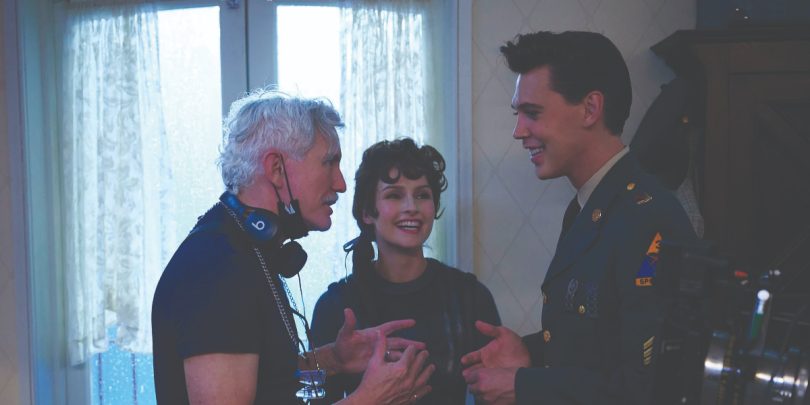BOLD talks exclusively to the team behind the Elvis biopic and
their experience of taking the audience down memory lane
Elvis Presley was not just an American singer but an icon, even when he was alive. The 42-year-old entertainer’s biopic Elvis brings him back to life with emphasis on his relationship with his manager as well as explains why his decline came earlier than expected. BOLD had an exclusive chat with the director Baz Luhrmann, and the lead actors Austin Butler, and Olivia DeJonge about their experience of taking the audience back into the era of Elvis, and what they took back with them when they returned to the present day.

Baz Luhrmann – The Director

Hollywood director Baz Luhrmann specializes in period films and had directed a musical long before there was any chance of an Elvis biopic. Be it the 1996 version of Romeo + Juliet, Moulin Rouge! five years later or The Great Gatsby in 2013, he has been there, done that during his career. He brought all that experience to play while making Elvis and feels that it would be relatable to the audience of today because what happens on the screen is exactly what’s happening in the real world.
‘Elvis gave us the chance to take a great life, great music, and explore bigger ideas and is more than just a story of the life of Elvis Presley. It is about the music scene in America during the 50s, the 60s, and the 70s and can be compared to the music scene of today. Also, it’s as much about the relationship between Elvis and his manager Colonel Tom Parker (played by Tom Hanks) and it is through them that we learn this side of the ‘show and the business’. Not only does it tell the audience about the management, the control, and the exploitation that brought down Elvis, but it is something that any generation can relate to since that’s happening even today.’

He also adds that it was quite difficult for him and his team to select a few moments of Elvis’s life to include in the film, and leave the rest.
‘There are moments in Elvis’ life without which his story wouldn’t be complete and we included those moments in the film. You can’t talk about America in those days without talking about the influence of the Black artists and the Black music which in turn influenced Elvis. He went on a journey that began with them, and it was because of his relationship with these characters that helped him to become the King of Rock and Roll.’
He emphasizes that this film makes the audience realize whether America has evolved from those days or not; whether they have grown as a nation or not. ‘It would be great if the generation that was born after Elvis’s death engages in a debate comparing those times with today and this film intends to help them decide.’
In choosing Colonel Tom Parker as the narrator of Elvis’ story, the director says that by doing so, he was able to explore many aspects of the King’s life which would have been difficult had it been a linear story.

‘Elvis’ own story is extraordinary where he was born and how he became a singer but from the Colonel’s eyes, you can explore him in many ways. Tom Hanks’ character debates with the audience about his relationship with Elvis and says that he is not the bad guy here. It is he who takes them back to the days when he discovered Elvis and made him a star and gives the audience tremendous dramatic tension in the story. His character allows the director to go places where he wouldn’t go and reveal things he wouldn’t reveal otherwise.’
According to Baz Luhrmann, by making the Colonel the narrator, he was able to show both sides of the story. The Colonel thought he was doing his job while Elvis was doing his. Why the entertainer failed is something the audience has to figure out.
‘There is a story that we haven’t included in the film about the Colonel where he calls for the printing of more records when he learns of Elvis’ death. To some, he might be a cold-hearted man but for others, he was just doing his job. It was a complicated relationship between art and commerce that we have tried to highlight here and the result is coming up with the most extraordinary stories of the American era!’
Austin Butler – Elvis Presley

For someone who was born in the 1990s, Austin Butler does a great job playing an American icon from the 1950s. In his own words, he had to become Elvis to know Elvis, and that’s what helped him in portraying the most impersonated man in America, with his heart and soul.
‘I didn’t do anything else during the last two years except being Elvis and was just obsessed with the character. I followed my curiosity during this time with some incredible people around me who helped me become Elvis in such a way that it would come as a biopic and not as a caricature.’
He thanks his movement coach, singing coach, dialect coach, and Karate instructor for helping him out in the best way possible.
‘I tried to be as meticulous as possible while playing Elvis and was most fascinated by the chance of showing his real side to the public. We stripped away the caricatures like his famous Halloween costume and got down to who he was in an empty room, at the end of the day, all by himself. I had to figure out how did he wake up in the morning, how was his private life, and what made him an incredibly sensitive, spiritual man. It was fun to bring out how he evolved over the years.’
Austin Butler also adds that due to playing Elvis, his relationship to fear has changed a lot. ‘I was able to connect with Elvis because we both felt fear – he because of being Elvis and me because of the amount of pressure I had faced playing him. It was such a huge responsibility and I had a fear that if done wrong, I would fail him, his legacy, his family, and his fans around the world who loved him so much. I felt it every day and it was such a good lesson because he felt fear too. One such moment must have been in ‘68 when his career was on the line and he felt his life was too. Bringing those moments to the screen was a challenge for me and the team that helped me be Elvis.’

To play a character that is alive in the minds of many Americans was always going to be challenging for any actor. However, Austin Butler feels that he had time on his hand otherwise it wouldn’t have been possible for him to sound like Elvis, dance like Elvis, and look like Elvis on the screen.
‘We had a year and a half before we started shooting Elvis. At first, it seemed impossible, with the amount of footage of Elvis singing and dancing out there, but when you look closely you find out that he evolved during his career. His voice changed over the years and by listening to his records, interviews, and videos between the 1950s and the 1970s, you can understand the difference.’
‘In order to get close to all these voices, I would take one voice and spend a day sort of living in that era. Because of all the caricatures of him out there, I took it upon myself to become Elvis in my own mind and doubled down to make it feel as if it was my life without falling into any of the traps of how he sounded like. I was struck by how subtle some things that he did were, from facial things to what he is doing on a larger scale. The fact of the matter is that it’s all coming from the music moving him.’
Olivia DeJonge – Priscilla Presley

It was a different experience for Olivia DeJonge who played the character of Elvis’ wife Priscilla, who is very much alive and was even on tour with the entire team. She claims that it helped her immensely by being around Priscilla, as she got the chance to understand how she felt during her time with Elvis as a girlfriend and later as the mother of his child.
‘I must say that having her around was an advantage for me and the prospect of having her around was exciting. The first time I met the lovely woman, I got to sit next to her. It was great to see into the eyes of the gorgeous woman you were playing and empathize with her. Thankfully, she was quite receptive and encouraging which was huge considering my portrayal could have gone the other way.’







